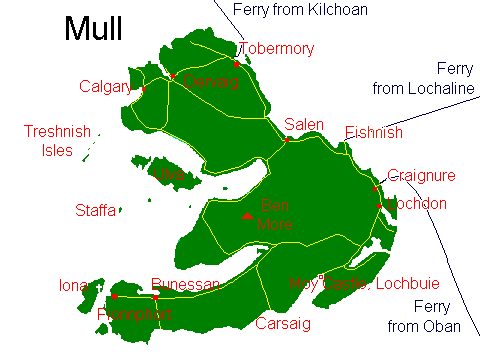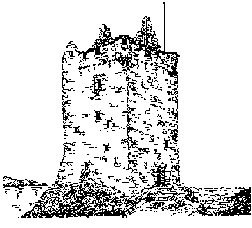
|
Maclaines on the Net Clan Maclaine Discussion Area Clan Maclaine of Lochbuie Contacts |

|
Maclaines on the Net Clan Maclaine Discussion Area Clan Maclaine of Lochbuie Contacts |

 Thus, the two dominant branches of the family were founded: Maclaine of Lochbuie and MacLean of Duart. The Maclaine family used the "MacLean" spelling until around 1600, when the present phonetic spelling was adopted. Many of the clansmen at Lochbuie retained other spellings of "MacLean" or "Maclaine", such as "MacLayne" or "McCLain".
Thus, the two dominant branches of the family were founded: Maclaine of Lochbuie and MacLean of Duart. The Maclaine family used the "MacLean" spelling until around 1600, when the present phonetic spelling was adopted. Many of the clansmen at Lochbuie retained other spellings of "MacLean" or "Maclaine", such as "MacLayne" or "McCLain".
Various smaller families intermarried or banded together with the Maclaines. Such families include the McFadyens, MacCormicks, Blacks, Beatons, MacGillivrays, MacAvoys, Huies, and Pattons (all with over 200 different spellings). They were accepted loyal Clan members.
 The Maclaines of Lochbuie occasionally feuded with the Duarts (the other MacLeans), but joined forces with them when threatened. One feud was put to rest when the Lochbuie Chief and his followers came upon the Duart Chief and his band in the woods. Duart and his followers were asleep, exhausted after losing a battle with the Lochbuie Clan. Lochbuie's followers wanted to immediately attack. Instead the Lochbuie Chief crept up on the Maclean of Duart and twisted MacLean's hair around his Dirk and stuck it in the ground. The Lochbuie Clan then left. When the Duart Chief awoke to find his hair nailed to the ground. MacLean of Duart recognized that it was Maclaine of Lochbuie's dagger. He was so moved by the act of mercy that he ended the feud.
The Maclaines of Lochbuie occasionally feuded with the Duarts (the other MacLeans), but joined forces with them when threatened. One feud was put to rest when the Lochbuie Chief and his followers came upon the Duart Chief and his band in the woods. Duart and his followers were asleep, exhausted after losing a battle with the Lochbuie Clan. Lochbuie's followers wanted to immediately attack. Instead the Lochbuie Chief crept up on the Maclean of Duart and twisted MacLean's hair around his Dirk and stuck it in the ground. The Lochbuie Clan then left. When the Duart Chief awoke to find his hair nailed to the ground. MacLean of Duart recognized that it was Maclaine of Lochbuie's dagger. He was so moved by the act of mercy that he ended the feud.
Lochbuie and Duart fought side-by-side at Killecrankie under Bonnie Dundee, but due to what proved to be wise advice, the Lochbuies did not, as a clan, join Bonnie Charlie in the uprising of 1745. Consequently, the Lochbuie estates were not lost as a result of the rebellion, as were Duart. The estates were lost, however, in 1920, and are currently owned by an English family.
Many Maclaines were forced or coerced by the Crown to settle the Ulster Plantation in Ireland as a way of subduing the Irish, or suffered economic hardships and were forced to leave Scotland. From Scotland or Ireland, many made their way to Canada, the United States, Australia, and other countries.






